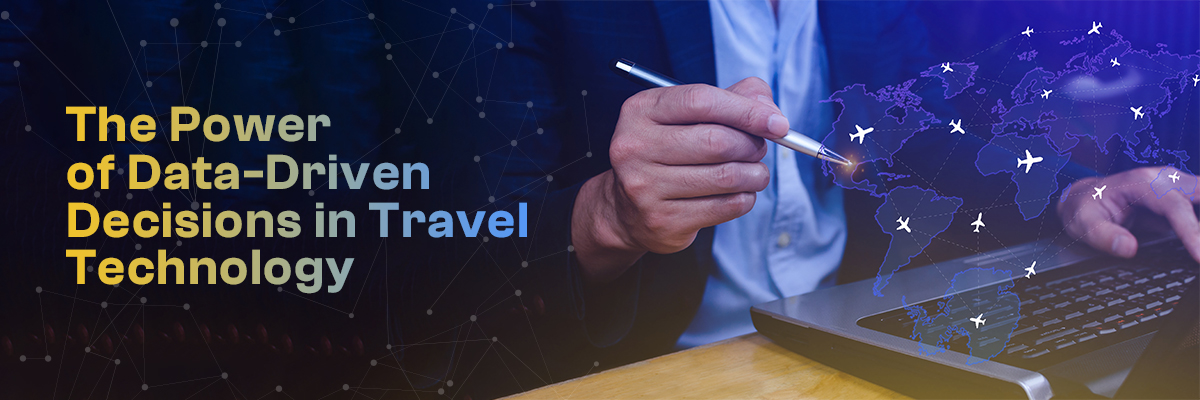The Power of Data-Driven Decisions in Travel Technology

While booking flight tickets have you ever noticed how the process seem to change every time you check? One minute, you see a deal, and the next, it’s changed. That’s data-driven decision-making in action.
Travel isn’t just about planes, hotels, and tour packages anymore. Businesses that can predict customer needs before they even realise them are the ones staying ahead.
With millions of people booking flights, hotels, and experiences every day, the travel industry is sitting on a gold mine of data. But raw data alone is useless. It’s what businesses do with it that makes the difference. The right data strategy transforms uncertainty into opportunity.
Where Data Makes the Biggest Impact
Creating a Better Customer Experience
Travel is personal. A honeymooner wants a different experience than a business traveller. Yet, for years, companies used one-size-fits-all marketing. That doesn’t work anymore.
With data-driven insights, businesses can:
- Recommend hotels based on past stays
- Offer exclusive discounts on frequently searched destinations
- Use dynamic pricing to adjust ticket costs in real time
Example: Airlines and hotels constantly change their prices based on demand, user behaviour, and even the device you’re searching from. A user on an iPhone might see higher prices than someone on a budget Android phone. That’s data-driven pricing at work.
Smarter Marketing (That Doesn’t Feel Like Marketing)
Most people don’t like being sold to. But they do like getting offers that actually interest them. Data-driven marketing targets people with exactly what they’re looking for, and that is why businesses love them as it makes the offer look genuine and something that interests their customers.
Instead of blasting ads to everyone, companies can:
- Showcase customised offers based on past bookings
- Send email promotions when a user’s favourite airline drops prices
- Further focus on search history & demographics to improve ad targeting
Example: If a user frequently books family vacations, travel companies can send them kid-friendly resort deals, not just random flight offers. That personal touch makes all the difference.
Cutting Costs & Managing Resources Better
Ever wondered how airlines know when to raise or lower ticket prices? It’s not guesswork, it’s predictive analytics.
Hotels and airlines use AI-driven tools to:
- Adjust pricing based on real-time demand
- Predict when they’ll be fully booked (or nearly empty)
- Manage staffing efficiently to cut costs
A hotel that knows its peak booking times can optimise room pricing, avoid overstaffing, and increase revenue without waste.
Fraud Detection & Security
With millions of online transactions happening daily, fraud is a serious issue in the travel industry.
- AI tools can spot suspicious booking patterns
- Businesses can flag and stop fraudulent transactions in real-time
- Customers are protected from scams and payment fraud
Example: If someone suddenly books a first-class ticket to another country on a new device, the system can flag it as potential fraud and request additional verification.
How Travel Giants Use Data to Stay Ahead
Example: Booking.com & Expedia
If you have ever used this platform, you’ll observe that these platforms don’t just show random hotels; they learn from user behaviour.
- If you always book 4-star hotels near city centres, they push exactly those options to the top.
- If you browse a destination multiple times, they send exclusive discounts to nudge you into booking.
This is data in action, turning casual browsers into paying customers.
Emerging Trends: Where Travel Data is Headed
The future of data-driven travel isn’t just about tracking user behaviour—it’s about predicting what they’ll want before they even know it. Here’s where the industry is headed:
- Hyper-Personalisation: Using AI and machine learning to tailor experiences down to the smallest detail. Expect travel companies to curate trip itineraries entirely based on past preferences.
- Real-Time Travel Assistance: AI chatbots are becoming more advanced, offering instant, human-like responses to travel queries, delays, and itinerary changes.
- Sustainable Travel Planning: Data analytics can help identify eco-friendly travel options, guiding users toward more sustainable choices.
- Voice and Image Search Integration: Instead of typing, users will simply speak or upload a photo, and AI will suggest relevant travel options.
How to Make Data Work for Your Business
- Use analytics tools like Google Analytics, Tableau, and Power BI to track trends.
- Segment your audience—not every traveller is the same.
- Automate processes to improve efficiency and customer service.
- Invest in predictive analytics to stay ahead of market trends.
- Prioritise data security—customers need to trust you with their information.
Final Thoughts
Think about it: The best travel companies don’t wait for customers to tell them what they want. Instead, they anticipate preferences, optimise pricing, and refine services before a traveller even realise their needs.
At the heart of this transformation is a simple truth: People want effortless and tailored experiences. They don’t want to sift through countless options; they want the right choices presented to them at the perfect time. Businesses that harness data effectively will dominate the market by delivering what customers want before they even ask for it.
The question isn’t whether data matters in travel. It’s how well you use it. If you’re ready to tap into the full potential of data and create travel experiences that feel intuitive, seamless, and personalised, now is the time to connect with Jet2TT and let’s take action.


